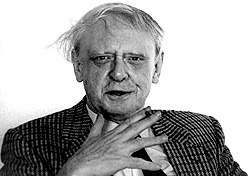Non-Fiction, A Mouthful of Air: Language and Languages, Especially English (1992)
Anthony Burgess Quotes
"Thoughts on Travel".
Non-Fiction, Homage to QWERT YUIOP: Selected Journalism 1978-1985 (1986)
Fiction, The Right to an Answer (1960)
Fiction, Beds in the East (1959)
remark made in 1971, cited in Roger Lewis, Anthony Burgess (2002), p. 152
General
Fiction, Beds in the East (1959)
“…Your little feuilleton…recording…my crude nabob’s philistinism…”
Fiction, The Right to an Answer (1960)
Fiction, The Right to an Answer (1960)
Fiction, Devil of a State (1961)
Fiction, The Right to an Answer (1960)
Non-Fiction, English Literature: A Survey for Students (1958, revised 1974)
At 59, unmarried, syphilitic and obscure, he dropped dead in a Paris street.
"Homage to QWERT YUIOP".
Non-Fiction, Homage to QWERT YUIOP: Selected Journalism 1978-1985 (1986)
Fiction, A Clockwork Orange (1962)
Non-Fiction, Homage to QWERT YUIOP: Selected Journalism 1978-1985 (1986)
"A Pox on Literature" - review of The Horror of Life by Roger L. Williams.
Non-Fiction, Homage to QWERT YUIOP: Selected Journalism 1978-1985 (1986)
Fiction, The Eve of St. Venus (1964)
Fiction, The Enemy in the Blanket (1958)
“Love seems inevitable, necessary, as normal and as easy a process as respiration.”
Fiction, The Right to an Answer (1960)
“…the British. Haughty, white, fat, ugly, by no means sympathique, cold…”
Fiction, The Enemy in the Blanket (1958)
Fiction, The Kingdom of the Wicked (1985)
Fiction, Time for a Tiger (1956)
“…with Indians there is an unhealthy love of the law…”
Fiction, The Enemy in the Blanket (1958)
Fiction, Earthly Powers (1980)
Fiction, The Right to an Answer (1960)
Fiction, The Right to an Answer (1960)
Fiction, Time for a Tiger (1956)
Fiction, The Clockwork Testament, or Enderby's End (1974)
Non-Fiction, Homage to QWERT YUIOP: Selected Journalism 1978-1985 (1986)
Fiction, The Worm and the Ring (1960)
"Don't," Carlo said, "underestimate yourself."
Fiction, Earthly Powers (1980)
Fiction, A Clockwork Orange (1962)
Non-Fiction, Homage to QWERT YUIOP: Selected Journalism 1978-1985 (1986)
Fiction, Beds in the East (1959)
Non-Fiction, Flame Into Being: The Life and Work of D. H. Lawrence (1985)
Non-Fiction, A Mouthful of Air: Language and Languages, Especially English (1992)
Fiction, The Eve of St. Venus (1964)
“Trade and gambling and a woman occasionally - that was a man’s life.”
Fiction, Beds in the East (1959)
“Rosemary’s reputation was known; he would, by obscure logic, become retrospectively a cuckold.”
Fiction, Beds in the East (1959)
“She sank again into the salty water…into the delicious warm brine-tasting depths of her grief.”
Fiction, Beds in the East (1959)
Non-Fiction, Homage to QWERT YUIOP: Selected Journalism 1978-1985 (1986)
Non-Fiction, Homage to QWERT YUIOP: Selected Journalism 1978-1985 (1986)
